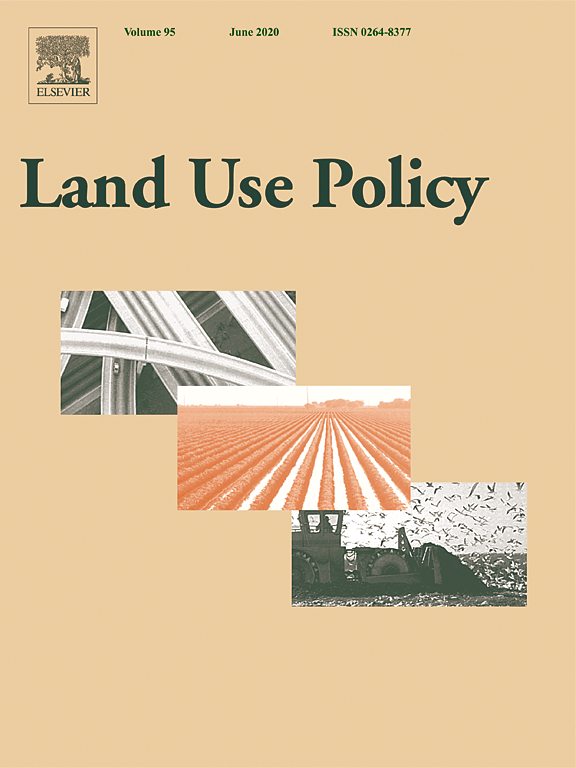Location
Land Use Policy is an international and interdisciplinary journal concerned with the social, economic, political, legal, physical and planning aspects of urban and rural land use. It provides a forum for the exchange of ideas and information from the diverse range of disciplines and interest groups which must be combined to formulate effective land use policies. The journal examines issues in geography, agriculture, forestry, irrigation, environmental conservation, housing, urban development and transport in both developed and developing countries through major refereed articles and shorter viewpoint pieces.
Land Use Policy aims to provide policy guidance to governments and planners and it is also a valuable teaching resource.
ISSN: 0264-8377
Members:
Resources
Displaying 261 - 265 of 279Climate, energy and environmental policies in agriculture: Simulating likely farmer responses in Southwest Germany
Agriculture in many industrialized countries is subject to a wide range of policy interventions that seek to achieve ambitious climate, energy and environment-related objectives. Increasing support for the generation of climate-friendly, renewable energy in agriculture, however, may lead to potential conflicts with agri-environmental policies aimed at land use extensification and landscape preservation.
Similarities and dissimilarities between the EU agricultural and rural development model and Romanian agriculture. Challenges and perspectives
The main aims of this study are to highlight the differences and the similarities between the European model of agricultural and rural development, and the state of play in the Romanian agricultural sector. Statistically speaking, the agricultural sector's indicators of the past two decades place Romania outside the family picture of the EU countries, with very slight resemblances, and very strong discrepancies between their economic, technical, and institutional characteristics.
Elephants over the Cliff: Explaining Wildlife Killings in Tanzania
Many incidents of elephant killings have recently taken place in Tanzania as well as in other African countries. Such events are usually presented as results of the rising global demand for ivory. As we show in this case study, however, not all violence against elephants is driven by the ivory trade. This article presents an event that occurred in West Kilimanjaro in 2009 when numerous villagers chased a herd of elephants over a cliff, killing six of them. Using a ‘web of relations’ approach, we seek to uncover the underlying as well as the immediate factors that led to this incident.
Institutional development for stakeholder participation in local water management—An analysis of two Swedish catchments
The EU Water Framework Directive (WFD) promotes a change of European water governance towards increased stakeholder participation and water management according to river basins. To implement the WFD, new institutional arrangements are needed. In Sweden, water councils have been established on the local level to meet the requirements of the WFD of a broad stakeholder involvement in water management. The aim of this paper is to contribute to the knowledge on institutional arrangements for meeting the WFD requirements on stakeholder participation in local water management.
A tale of two villages: An investigation of conservation-driven land tenure reform in a Cambodian Protection Forest
In this paper, we present an analysis of the change in household land use following a conservation-driven process of indigenous land titling reform in a Cambodian protected area. In each of the two study villages, we investigated how household land use had changed and the extent of compliance with both legal boundaries of titled areas and community regulations created to govern land use within these areas. A comparison of current household land holdings in each village with those at the start of the tenure reform process indicated a significant increase in household land holdings.



